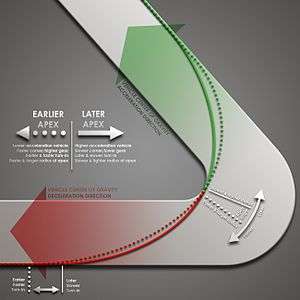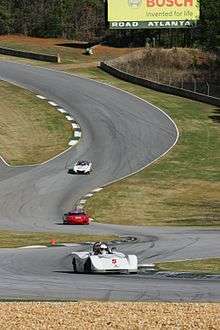Racing line
In motorsport, the racing line or simply "the line" is the path taken by a driver through a corner or series of corners with the typical goal of minimizing lap times.
When analyzing a single corner, the optimum line is one that minimizes the time spent in the corner and maximizes the overall speed (of the vehicle) through the corner. If one used the path with the smallest radius, that would minimize the distance taken around that corner. However, by fitting a curve with the wider radius through the corner, the higher average speed which can be maintained more than compensates for the extra distance travelled.[1]
Racing line optimization
A primary goal of the racing driver is to determine the optimum line around a race track. This optimum line may vary depending on whether a driver wishes to achieve a minimum lap time during a qualifying session, conserve tires and fuel, or fend off a pass from another driver during a race.
Race tracks are often broken down into separate elements such as standard corners, chicanes, double apexes, and straights. A corner can then be further broken down into the deceleration phase of corner entry, followed by the apex, and finally the acceleration phase during corner exit.
Standard corner

A standard corner is one which is separated from any other corner by straights before and after. This can range from a tight 180 degree hairpin to a high-speed corner with little direction change needed.
Corner entry
The corner entry phase often begins with straight-line threshold braking where the goal is to achieve maximum deceleration rate. This is followed by the turn-in where the driver begins to steer the vehicle toward the apex. Traditionally, many drivers were taught to complete all braking before this turn-in portion and take a more circular path with a constant speed to the apex. Later, many racing drivers started to incorporate trail-braking into their corner entry. Trail-braking involves carrying brake pressure past the turn-in point which allows the forces generated by the tires to decelerate the car in a more optimized direction. This more optimized direction of force causes a vehicle to travel on a Euler spiral shaped path of decreasing radius to the apex. If done properly, this results in a higher average speed and lower elapsed time to the apex compared to the traditional circular entry.
Apex
In basic terms, the apex or clipping point is the point on the inside portion of a corner that a vehicle passes closest to. The apex can also be described as the point of minimum radius and slowest speed achieved in a corner. An apex can be defined as being an earlier apex or later apex. An earlier apex will reach the inside of a corner at a higher speed and with a larger radius than a later apex. A driver will typically choose their apex based on their vehicle's corner exit abilities with higher acceleration optimally requiring a later apex.
Corner exit

The corner exit phase begins at the apex when the vehicle begins to accelerate. The corner exit phase is often understood to be the most important aspect of a corner for minimizing lap times and so a driver will often focus on optimizing corner exit performance. A driver's goal during corner exit is to maximize the acceleration of the vehicle in the direction of the following straight. Vehicles with lower acceleration potential in a corner will typically achieve this by applying full throttle from the apex and taking a more circular path. Higher acceleration vehicles may be limited by wheelspin and will not achieve full throttle until the corner is nearly complete. This will create a corner exit path of increasing radius that will often mirror the Euler spiral-shaped corner entry path.
Chicane

A chicane is a section of a race track where one turn is quickly followed by another in the opposite direction. This can also sometimes be described as a compromise corner or esses.
Double apex
A double apex is a section of a race track where one turn is quickly followed by another in the same direction.
References
- ↑ Beckman, Brian (1991). "The Physics of Racing, Part 5: Introduction to the Racing Line". Retrieved 2008-08-27.
External links
- The racing line explained
- Video explaining the racing line
- Video explaining the physics of the racing line